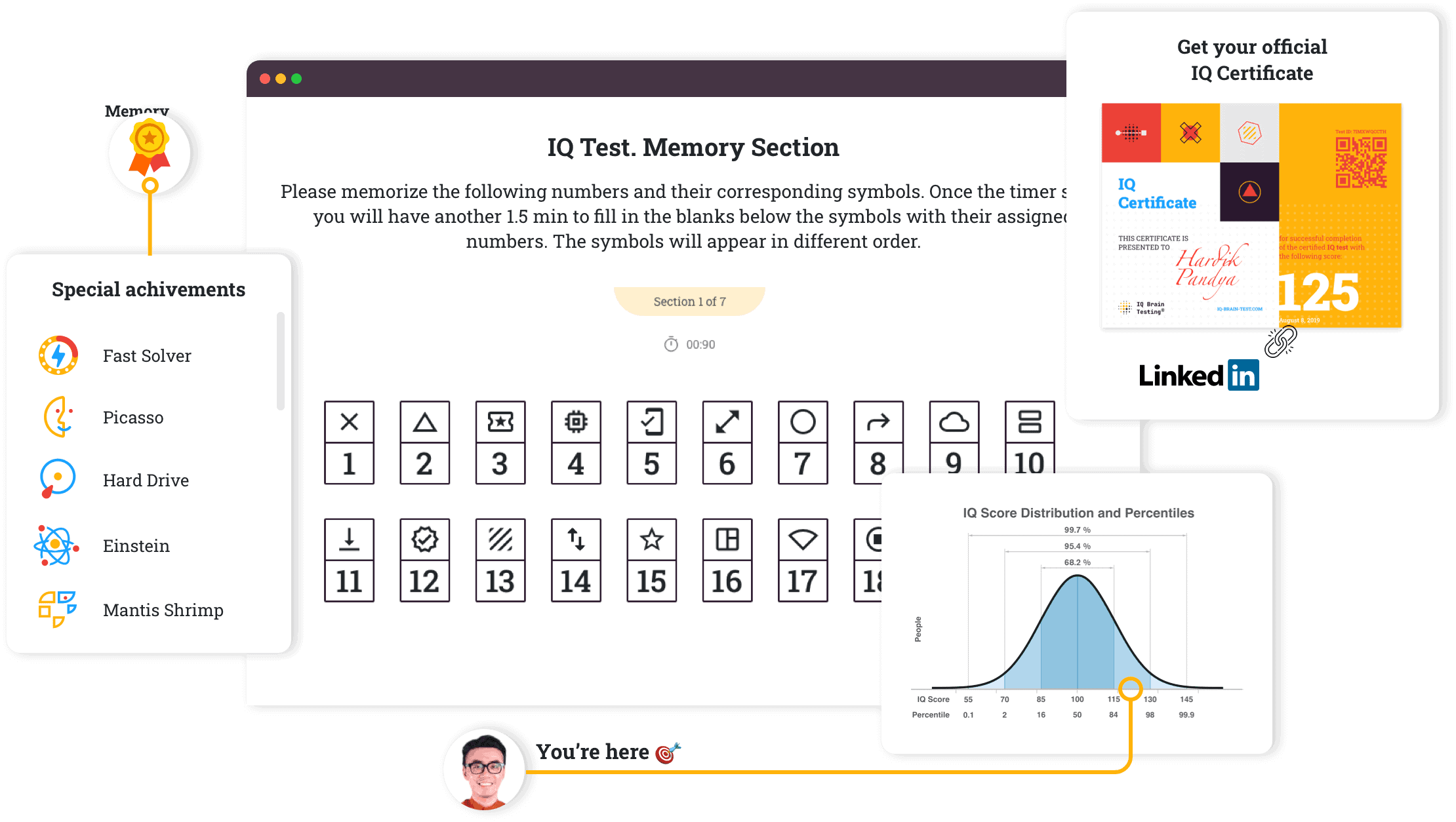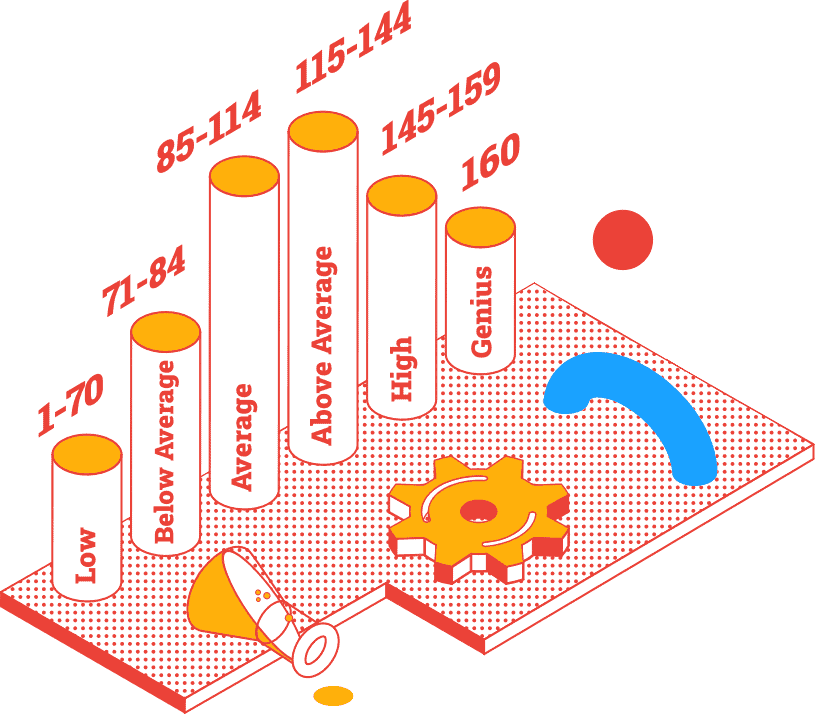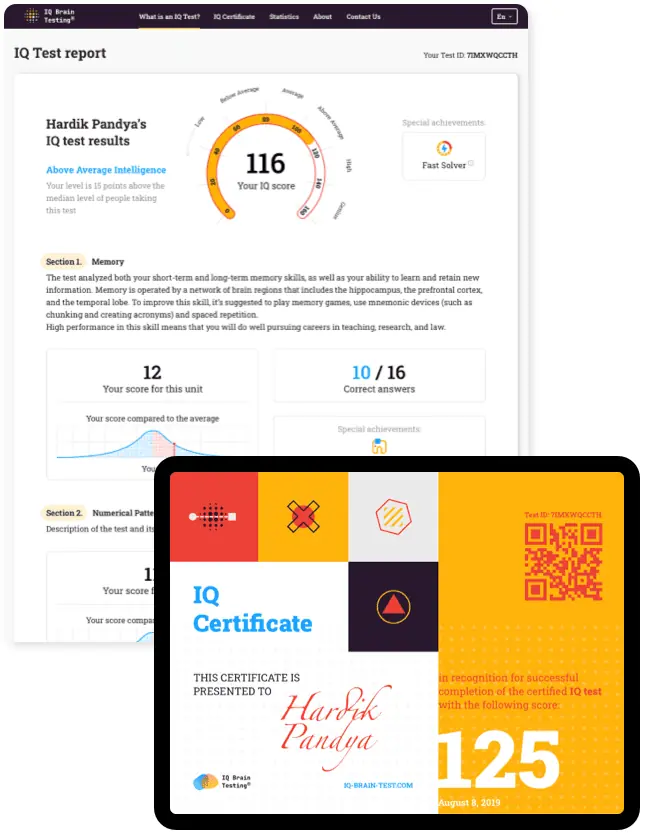What is an IQ Test?
An IQ test measures someone's cognitive abilities or intelligence in relation to their age group. Results are generally reported as an IQ score, which is a standard score that can be used to compare a person's cognitive abilities with those of others their age.
What does an IQ score measure?
The IQ score measures a person's general intelligence or cognitive abilities. Most IQ tests include a mix of verbal, mathematical, and spatial reasoning questions. The score is based on the number of questions answered correctly and the difficulty level of the questions.
What are IQ tests used for?
There are lots of reasons to take an IQ test. Schools and companies use IQ tests to identify students and employees with high intellectual potential. There's a chance these people will be considered for gifted and talented programs or leadership positions. IQ tests can also diagnose learning disabilities or intellectual disabilities in people who have trouble at school. Tests like these can help identify areas of cognitive weakness and help develop treatments. An IQ test is often used to determine or suggest the right kind of education and occupation based on a person's cognitive abilities. When selecting candidates for a college or graduate program, an IQ test might be administered. It could also be used for employee selection. Research on intelligence and cognitive abilities also uses IQ tests. These tests can be used to study the relationship between intelligence and other factors, like genetics, the environment, and education.
What type of Questions are included on an IQ Test?
Verbal reasoning questions test your ability to understand, analyze, and interpret written information. Test takers might have to identify logical relationships between words or ideas based on the context of a word.
Questions about mathematical reasoning: These test your ability to solve problems and understand concepts. Mathematical reasoning questions may require you to do calculations, solve equations, or interpret graphs.
Questions about spatial reasoning: These test your ability to think in three dimensions. Test takers might have to manipulate objects in their minds or identify patterns in visual stimuli to answer spatial reasoning questions. Logical reasoning questions: These questions test how well you can analyze logical arguments. Test takers might have to evaluate the logic of a statement or identify the strengths and weaknesses of an argument.
How is an IQ test Calculated and scored?
The format and structure of most IQ tests are similar. You have to answer verbal, mathematical, and spatial reasoning questions, and you get a score based on how many you get right and how hard the questions are. Then your score is compared to other people in your age group.
A standard IQ test has a mean of 100 and a standard deviation of 15.To calculate an IQ score, test takers' raw scores on the various tasks are converted into a standard score with a mean of 100 and a standard deviation of 15. This process allows test developers to compare an individual's performance to the performance of a large, representative sample of people of the same age.
For example, if someone scores in the top 2% of their reference group on a particular task, their score would be higher than 98%. It would mean a standard score of 130 or higher on that task, which is considered highly gifted.
What is a "normal" IQ score?
A typical IQ test usually has a mean of 100 and a standard deviation of 15. About 68% of people will score between 85 and 115 standard deviations from the mean, and about 95% will score between 70 and 130 standard deviations. It's usually considered "normal" or "average" to have an IQ score in this range.
What is a "good" IQ score?
A "good" IQ score is subjective and can depend on the specific test and the context in which it is used. However, most IQ tests use a standard score, with a mean of 100 and a standard deviation of 15. This means that about 68% of people will score within one standard deviation of the mean (between 85 and 115), and about 95% of people will score within two standard deviations (between 70 and 130). Here are some general guidelines for interpreting IQ test scores: A score between 80 and 100 is considered "average" intelligence. A score between 100 and 120 is considered "above average" or "superior" intelligence. A score between 120 and 140 is considered "very superior" intelligence. A score above 140 is considered "extremely superior" intelligence.
What IQ Score is Considered Genius?
'Genius' usually refers to someone who has exceptional intelligence or talent, but there's no IQ score that defines genius.
An IQ score of 130 or higher is generally considered "gifted" by the American Psychological Association.
People also consider IQ scores over 140 to be genius levels. Based on the standard deviation of intelligence scores, a score of 100 is average, and a score of 15 points above or below the mean is one standard deviation. This definition says a score of 140 or higher is very rare, with only 0.25% of the population having this score.
What does it mean if my IQ score is above or below the "normal" range?
It's generally considered "above average" or "superior" if your IQ score is over 115. If your IQ score is below 85, you're usually considered "below average" or "deficient." It's important to note that these are just general guidelines, so IQ scores can be interpreted in different ways depending on the test and the context.
How can I prepare for an IQ test?
There is no specific way to "prepare" for an IQ test, as the test is designed to measure innate cognitive abilities rather than learned knowledge. However, some tips for doing well on an IQ test might include getting a good night's sleep before the test, staying relaxed and focused during the test, and trying to stay calm if you encounter questions that are difficult or unfamiliar.
Can an IQ test accurately measure intelligence?
IQ tests are designed to measure a specific set of cognitive skills, and they may not capture other important aspects of intelligence, such as creativity, emotional intelligence, or practical problem-solving skills. Additionally, IQ test scores can be influenced by a variety of factors, such as motivation, test-taking skills, and cultural background. As a result, it is important to interpret IQ test scores with caution and to consider them in the context of other relevant information about a person's abilities.
Are IQ tests fair?
There have been arguments about the fairness of IQ tests, arguing that they may be biased against certain groups of people or may not reflect someone's true intelligence. While some IQ tests have biases, many modern IQ tests are designed to be as fair and unbiased as possible. All tests can be influenced by a variety of factors, and no test is 100% fair or objective.
Are IQ tests accurate?
It's considered reliable and valid to measure cognitive abilities with IQ tests. Nevertheless, no test is perfect, and there may be some error or variability. Additionally, IQ tests are just one way to measure intelligence, and there are many other ways to be smart.
Can my IQ score change over time?
Research shows that IQ scores change a bit over time, especially in early childhood and adolescence. The change is usually small and may not be statistically significant. IQ scores may also go up slightly with education and cognitive training, according to some studies.
Can I improve my IQ score?
Certain activities, such as education and cognitive training, may increase IQ a little. It's important to remember that intelligence is a complex trait influenced by a lot of factors, so no single intervention will boost someone's IQ by much.
Is there a "genetic" component to IQ?
Intelligence is influenced by genetics, but it's not the only factor. The environment can also affect cognitive abilities, like nutrition, education, and social experiences.
How are IQ questions invented?
Psychologists or experts in cognitive psychology typically design IQ questions. There are several steps to creating an IQ test or question:
Identifying the test's purpose: The first step in creating an IQ test is figuring out what it's going to measure and what it's going to measure. A test can be designed to assess specific cognitive abilities by reviewing existing research on intelligence.
Create test items: Once the purpose of the test is determined, test developers can start creating test items. They can be based on existing tests or they can be completely original.
Test the items: Before an IQ test is given to a large group of people, it's typically pilot-tested on a smaller group to make sure it's reliable and valid. This involves giving the test to the pilot group and analyzing their scores to make sure the test is measuring what it should. Depending on the results of the pilot test, the test can be revised and refined to improve its reliability and validity. Test items may need to be added, removed, or modified. Once the test is finalized, it can be given to a larger group. After the test, the results can be analyzed and used to identify strengths and weaknesses.
I should mention that creating an IQ test is a complex process that involves a lot of research and development. Test developers work to make sure that IQ tests are reliable, valid, and culturally fair, since their goal is to accurately assess cognitive abilities.
What Jobs Require IQ Tests?
Some jobs require IQ tests as part of the selection process. Some of these jobs require workers to have advanced cognitive skills or to learn and adapt quickly.
Here are some jobs that may require an IQ test: Some military and law enforcement jobs require applicants to take an IQ test. Tests like these can help determine an individual's problem-solving abilities. Technical or scientific jobs may also require applicants to take an IQ test as part of the selection process. These tests may be used to assess an individual's aptitude for math and science, which most IQ tests examine, as well as their ability to understand and analyze complex information. Some professional positions, such as management or executive roles, may also require applicants to take an IQ test as part of the selection process. Since managers need to solve complex problems quickly in their daily work routines, IQ tests are used to target those best suited for this type of high-level jobs.
What Happens if I Get All the Questions Right in an IQ Test?
If you get all of the questions correct on an IQ test, it is likely that you will score very high on the test. The exact score that you receive will depend on the specific test that you are taking, as well as the norms or standards that are used to interpret the test results.
Most IQ scores fall within a certain range and a smaller number fall at the high and low ends of the scale, but they're typically distributed in a bell-shaped curve throughout society. If you get all the questions right on an IQ test, you're likely to score in the top 5% of test takers and be considered highly intelligent.
What is the hardest IQ test?
There isn't one "hardest" IQ test since different tests can target different cognitive abilities and challenge different people differently.
There are some tests that are considered harder than others, like Raven's Advanced Progressive Matrices, Cattell Culture Fair III, and Wechsler Adult Intelligence Scale (WAIS).
These tests may require more time and effort to complete than other types of intelligence tests.
What are the Hardest IQ Test Questions?
A hard IQ test question is difficult to pinpoint, since different questions are harder or easier for different people, and there's no one "correct" way to measure intelligence. Different tests can focus on different areas of cognitive ability and may have more or less difficult questions.
That being said, some examples of challenging questions that might be found on an IQ test include:
A logical reasoning question requires the test taker to analyze and interpret complex information in order to draw a conclusion. A spatial reasoning question that requires the test taker to manipulate and transform mental images. A verbal reasoning question that requires the test taker to evaluate the relationships between words and concepts
How Can I Get a Higher IQ score?
There's no one way to "get a higher IQ score," because intelligence is a complex trait that's influenced by genetics, the environment, and experiences. Nevertheless, research shows that certain activities and behaviors can contribute to cognitive development and even improve intelligence.
Here are a few suggestions that may help you boost your IQ:
Play brain-challenging games like puzzles, crosswords, chess, or other games that require problem-solving.
Get a good education: Research has shown that education is associated with improved cognitive abilities and higher IQ scores.
Get enough sleep: Sleep is important for brain function and can help with memory, learning, and problem-solving.
Eat a healthy diet: A diet that is rich in fruits, vegetables, and other nutrient-dense foods may support brain health and cognitive function.
Stay physically active: Physical activity has been shown to have a positive effect on brain function and may improve cognitive abilities.
How can I Succeed in an IQ Test and Improve My Score?
There are a few strategies you can use to succeed in an IQ test:
Practice: Some tests may include practice questions or sample tests that you can use to familiarize yourself with the format and types of questions that will be asked. By practicing, you can improve your test-taking skills and increase your confidence.
Stay focused: IQ tests can be challenging, and it's important to stay focused and concentrate on each question. If you get stuck on a question, try to take a deep breath and relax. You can also try to break the question down into smaller parts or consider it from different angles.
Manage your time: Most IQ tests are timed, and it's important to manage your time effectively. Make sure to read and understand each question carefully before answering and try to pace yourself so that you have enough time to complete all of the questions.
Stay calm: It's natural to feel a little nervous before taking an IQ test, but try to stay as calm as possible. Take deep breaths and try to focus on the task at hand.
Get a good night's sleep: Make sure to get a good night's sleep before the test. Research has shown that sleep is important for brain function and can help with memory, learning, and problem-solving.
By following these strategies, you may be able to improve your performance on an IQ test and achieve a higher score.
What are the Benefits of an Online IQ Test?
Online IQ tests have several advantages over live IQ tests administered by a professional:
The first thing is convenience: You can take online IQ tests from anywhere you have an internet connection, which may be more convenient than going to a testing center.
The second benefit is immediate results. Online IQ tests often provide instant results, which can be helpful for people who need to know their score right away.
The third is cost: Online IQ tests may be less expensive than live tests administered by a professional.
Lastly, Variety: There are many different online IQ tests available, so individuals may have more options to choose from.
What is the oldest test for measuring intelligence?
In the late 19th century, Sir Francis Galton developed the first known intelligence test. Galton was a British scientist and cousin of Charles Darwin, the father of intelligence studies. "Galton's Scale of Mental Ability" measures cognitive abilities like memory, perception, and problem-solving through a series of simple tasks.
In the early 20th century, French psychologist Alfred Binet developed the first widely used intelligence test. Binet was asked by the French government to come up with a test to identify kids who weren't performing at grade level. As a result, they'd get extra help. The test, called the "Binet-Simon Scale," assessed a range of cognitive abilities and was widely used as the basis for other intelligence tests.
The tests developed by Galton and Binet are considered to be among the oldest intelligence tests. However,ut a lot more have been developed since then, and the field of intelligence testing keeps growing.
What Live Applications Does an IQ Test Have?
There are a variety of live applications for IQ tests, including:
Educational and occupational testing: IQ tests are often used to assess cognitive abilities and identify areas of strength and weakness in educational or occupational settings. This may involve administering an IQ test as part of the admissions or hiring process for a particular program or job.
Clinical and research settings: IQ tests are also commonly used in clinical and research settings to assess cognitive abilities and identify possible learning disabilities or other cognitive impairments.
Military and law enforcement: IQ tests are sometimes used in the military and law enforcement as part of the selection and evaluation process for candidates.
Coaching and tutoring: Some individuals may choose to take an IQ test as part of a coaching or tutoring program in order to identify areas of strength and weakness and develop a customized learning plan.
Personal development: Some people may take an IQ test for personal development purposes, such as to learn more about their cognitive abilities or to identify areas where they may be able to improve.
How long does an IQ test usually take?
Test length can vary depending on the type of test and the individual being tested. It may only take 30 minutes for some tests, but it might take several hours for others.
Most IQ tests are designed to be completed in one sitting and take between 60 and 90 minutes. During this time, the test administrator explains instructions, answers questions, and administers sub-tests and tasks.
IQ tests are usually challenging and require a lot of concentration and mental effort to complete. It's important to stay focused and do your best, but you also need to take breaks as needed and pace yourself so you don't get too tired.
How Often Should I Take an IQ Test?
There is no specific frequency at which you should take an IQ test. Many people only take an IQ test once in their lifetime, while others take them more frequently for work or other reasons.
It's worth noting that IQ scores are not meant to be static and can change over time. Age, education, and life experiences all affect cognitive abilities and can affect IQ test performance. As a result, you may get different results at different times.
Can a computer test your IQ?
Yes, it is possible for a computer to generate an IQ test. In fact, many modern IQ tests are administered and scored electronically, using software programs or online platforms.
Computer-generated IQ tests measure a variety of cognitive skills, including logical reasoning, problem-solving, verbal aptitude, and mathematical aptitude. Multiple-choice questions, fill-in-the-blank exercises, puzzles, and games are some examples.
In the same way as traditional paper-and-pencil IQ tests, computer-generated tests measure cognitive abilities. They are typically scored according to a standard set of norms, using a process similar to that used for paper-and-pencil tests.
Can a Computer Do Better than a Human in an IQ Test?
Can a Computer Do Better than a Human in an IQ Test?
It is possible for a computer to outperform a human on certain tasks or subtests that are included in an IQ test. The reason for this is that computers can process and analyze large amounts of data quickly and accurately, and they can perform specific tasks precisely.
However, intelligence is more complex and multifaceted than one test or score can accurately measure.
While computers may be able to outperform humans on certain tasks included in an IQ test, they are not necessarily more intelligent overall. Intelligence is a complex trait that cannot be accurately measured by a single test or score.
What is the minimum age for an IQ test?
There is no minimum age for taking an IQ test. Children as young as 3 or 4 years old may take some IQ tests designed specifically for them. Some tests are designed for adults and may be administered to anyone.
You can take an IQ test at any age if you can understand and follow the instructions. It's probably not a good idea to give an IQ test to kids who are too young or can't concentrate for long periods.
The IQ score can change over time, and it's not guaranteed to stay the same throughout a person's life. People's cognitive abilities can be affected by factors like age, education, and life experiences. Therefore, a person's IQ score can vary based on their age and how they take the test.
What Can I Do if I Have a High IQ Test Score?
If you have a high IQ, you might have exceptional cognitive abilities.
Individuals with high IQ scores may have some advantages and opportunities. For example, people with high IQs are more likely to succeed in certain academic or professional fields that require advanced cognitive skills. They may also have an easier time learning new things and adapting to new situations.
In the end, what someone does with a high IQ score depends on their interests, goals, and values. Many people with exceptional cognitive abilities pursue careers in science, engineering, or medicine, while others use their skills for more creative or artistic pursuits. High IQ people can take many different paths, but the most important thing is to find something meaningful and fulfilling.
Are there any special organizations or groups for people with high IQs?
There are several organizations that are specifically designed for people with high IQ scores or exceptional cognitive abilities. Members of these organizations often get resources, support, and networking opportunities, and they might also sponsor events or activities related to intellectual development.
The following are some organizations for people with high IQs:
Mensa: This is perhaps the most well-known organization for people with high IQ scores. Mensa is an international society that is open to anyone who scores in the top 2% of the general population on a standard IQ test. Mensa offers a variety of resources and activities for its members, including local groups, social events, and educational programs.
The Prometheus Society: This is another organization for people with high IQ scores. The Prometheus Society is open to anyone who scores in the top 0.01% of the general population on a standard IQ test. It offers a variety of resources and activities for its members, including online forums, local groups, and intellectual challenges.
Intertel: This organization is similar to Mensa and the Prometheus Society, but it is open to anyone who scores in the top 1% of the general population on a standard IQ test. Intertel offers a variety of resources and activities for its members, including online forums, local groups, and intellectual challenges.
Membership in these organizations is by invitation only, and typically requires test scores or other documentation to prove you're qualified. Fees may also apply.
Aside from these organizations, there are many other groups and organizations that may interest people with high IQ scores. Among them are academic societies, professional associations, and other groups.
Do high IQs predict other personality traits?
Some personality traits and IQ scores are weakly correlated. People with higher IQ scores tend to score higher on certain personality traits, such as openness to experience, curiosity, and adaptability. Also, these individuals may have a growth mindset, which is the belief that intelligence and abilities can be improved over time.
The relationship between IQ and personality is complex and not fully understood. IQ scores may be correlated with certain personality traits, but they do not necessarily predict how someone will behave in every situation. Values, goals, and life experiences also influence a person's personality.
Do IQ Tests Have a Min or Max Score?
Most IQ tests do not have a Minimum or Maximum score. Instead, they are designed to measure a range of cognitive skills and abilities and produce a standard score with a mean of 100 and a standard deviation of 15. By doing this, test developers can compare an individual's performance to the performance of a large, representative sample of people.
If an individual scores in the top 2% of the reference group on a particular task, their score would be higher than 98% of the reference group's score. This would put you in the highly gifted range with a standard score of 130 or higher.
















